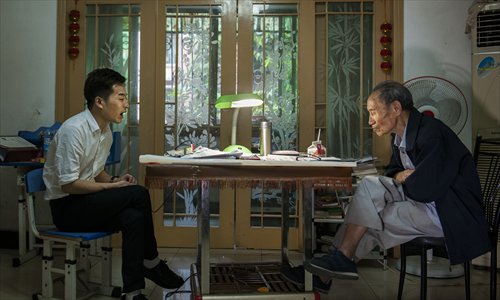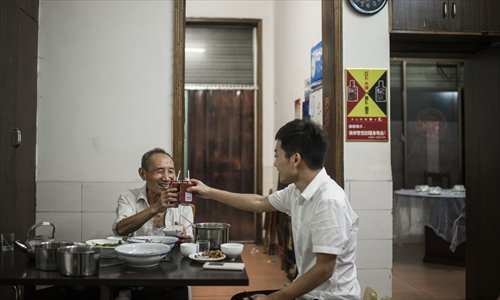HOME >> CHINA
Recruiting a companion
Source:Global Times Published: 2015-10-28 17:43:01

Chen makes news clippings to kill time. Photo: CFP

Chen takes notes when interviewing Liu, who later became his roommate. Photo: CFP

Chen walks home after buying groceries. Photo: CFP

Chen celebrates the Mid-Autumn Festival with his new roommate, barber Liu Dinghua, in a restaurant near their home. Photo: CFP

Chen’s granddaughter, now in middle school, visits him one day but they have lunch separately because the granddaughter doesn’t like his cooking. Photo: CFP
Chen Shifa, from Changsha, Hunan Province, lived alone after his wife died two years ago. The 83-year-old had few visitors, he barely spoke to other people, and his days followed two patterns, either reading newspapers - he subscribed to three - and making news clippings, or dozing off while watching television.
Chen, whose children work away from home, is a member of the growing "empty nester" population in China. A survey in 2013 showed that there were 100 million empty nesters then, and that number is expected to reach 200 million by 2030.
In a desperate effort to find someone - anyone - to talk to, Chen turned to placing an advertisement in a newspaper. "One room with air-conditioning. Free rent, free utilities, one requirement: you have to be good-natured and keep me company," the ad read.
He started to receive phone calls from interested potential tenants, including a retired worker, a single mother with a child, and a young barber, among others. He insisted on interviewing everyone at their place, sometimes traveling hours to meet them, just so he could verify their identities and get to know their background.
Not everyone made it to the interview stage. He refused to meet one candidate after talking to her on the phone. It was a woman from the countryside who worked as a domestic helper in Changsha. She told Chen she could take care of him, but Chen feared that "she wanted me to give her my apartment after I die."
After careful consideration, he picked Liu Dinghua, a barber, to become his roommate. Chen drafted the rental agreement himself, outlining several responsibilities and obligations, including the tenant's duty to keep him company, and offer him assistance, such as calling the hospital when Chen is ill.
Liu didn't turn out to be the perfect choice, often returning home after 10 pm, when Chen had already fallen asleep. But Chen had to lower his expectations. As long as he knows there's someone living in his house, he feels less lonely.
Global Times
Posted in: In-Depth